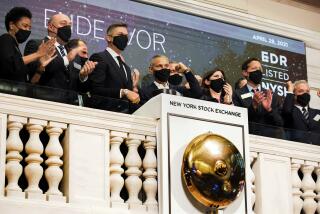Best Buy founder Richard Schulze’s shadow hangs over annual meeting
- Share via
MINNEAPOLIS — For all the talk of reinvention swirling around Best Buy Co. these days, perhaps the most profound transformation has occurred in the most unlikely of people: Richard Schulze.
Over the last three months, the founder of the world’s largest consumer electronics retailer has unexpectedly morphed from ultimate company insider and perceived protector of the status quo to a silent enigma. This month Schulze unexpectedly resigned from the board to “explore all available options” for his 20% stake in Best Buy.
The mystery surrounding Schulze could create quite a spectacle at Best Buy’s annual shareholders meeting Thursday. Although it’s unclear whether Schulze even plans to attend, the stakes are high. After months of uncertainty about Best Buy’s leadership, declining sales and a falling stock price, investors are eager to hear who’s really in charge and if the company has a more distinct vision for how it will thrive.
A Best Buy spokesman did not respond to a request for comment.
Schulze has remained mum about his plans. Some analysts suspect that he will dump his shares, but Best Buy’s former chairman and chief executive is exploring a bid to take the company private, according to sources close to the situation.
Given its high price tag, a private buyout is highly unlikely. But Schulze, even in his silence, has already succeeded in forcing investors to take a long hard look at Best Buy’s future.
“He’s certainly stirring things up,” said Laura Kennedy, an analyst with Kantar Retail consulting firm outside of Boston. “He’s got people thinking, ‘What is the next step?’”
If anything, Best Buy’s current leadership team, including interim CEO G. “Mike” Mikan, needs to give shareholders attending the meeting more details on how they plan to fix the struggling retailer, Kennedy said. Mikan has promised to unveil a long growth strategy but hasn’t disclosed any specifics.
Should Schulze and his allies offer $10 billion to $12 billion, or about $30 a share, for Best Buy, investors may gladly take it no matter what strategy Mikan and the board of directors cook up.
“Anything that says Best Buy stock is worth more is great for shareholders,” said Michael Pachter, an analyst with Wedbush Securities in Los Angeles. “It’s never bad for insiders to say the stock is undervalued.”
Wall Street, though, doubts that Schulze can pull off such a deal. He must persuade investors to buy a company that has struggled in the face of competitors like Wal-Mart Stores Inc. and online retailers like Amazon.com Inc.
“Best Buy has been ‘cheap’ for a while, and we haven’t seen anyone step up and make a bid, which leads us to believe that many potential investors still fear the risk of [such] head winds,” Daniel Binder, an analyst with Jefferies & Co., wrote in a research note.
Mere talk of a takeover has helped shareholders. From a May low below $18, Best Buy shares have risen to Wednesday’s close of $20.31, up 8 cents.
Schulze doesn’t necessarily need to buy the company to boost shareholder value. He could try to replace the board of directors and management team, or he could push the board to cut costs deeper and return money to shareholders faster by selling off assets.
Schulze’s history, however, suggests that he is less activist investor than proud entrepreneur, analysts say. His critics say he suffers from the same problem that inflicts many founding entrepreneurs: the inability to shrink the business because they are too attached to the company.
Lee writes for the Star Tribune (Minneapolis)/McClatchy.
More to Read
Inside the business of entertainment
The Wide Shot brings you news, analysis and insights on everything from streaming wars to production — and what it all means for the future.
You may occasionally receive promotional content from the Los Angeles Times.










